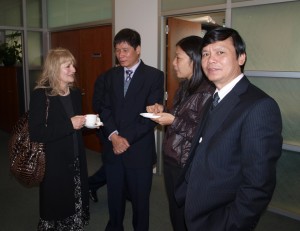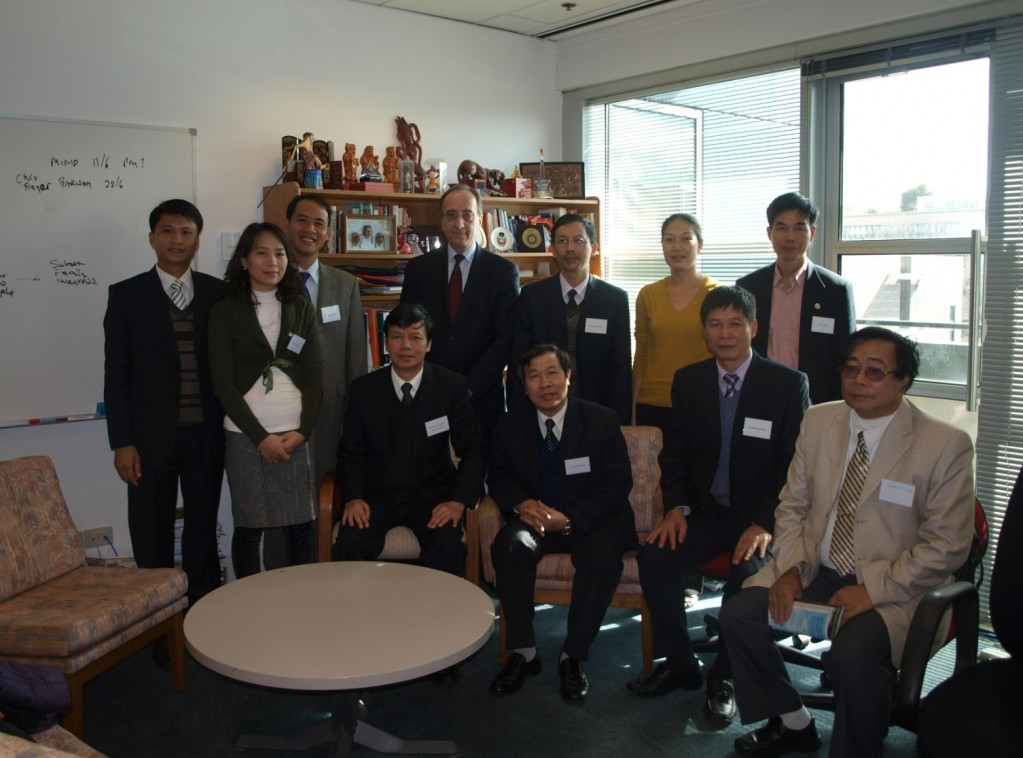MOLISA Vice-Minister and colleagues from Viet Nam visit Melbourne
Resource type: News
Centre for International Mental Health | [ View Original Source (opens in new window) ]
By Harry Minas. During the week of 23-27 August 2010 a 10-person delegation from Viet Nam’s Ministry of Labour Invalids and Social Affairs (MOLISA) visited Melbourne to learn about the Victorian approach to provision of community mental health services, with a focus on arrangements for the provision of social support services to people with mental disorders.
The delegation was lead by Vice Minister Nguyen Trong Dam and included senior officers from MOLISA, Ministry of Finance, a provincial Department of Labour Invalids and Social Affairs, The Institute of Labour and Social Affairs and the Research and Training Centre for Community Development.

Vice Minister Nguyen Trong Dam with Vietnamese and Melbourne colleagues
The visit was arranged following a WHO short-term consultancy, carried out by this author in 2009, that provided advice to MOLISA on reform of the Ministry’s network of social protection centres for people with enduring neuropsychiatric disorders
MOLISA has already started implementing a number of the recommendations made in that WHO report, and is now embarking on a wide-ranging and ambitious program of reform of the social protection centres (residential institutions that are in urgent need of reform) and development of community-based social support services. A key element of the capacity building that will underpin these community services will be the training of large numbers of social workers – a program announced by Viet Nam’s Prime Minister in March 2010 – who will constitute the major component of the community workforce.
During the visit the delegation had discussions with the Victorian Department of Health. Mr Martin Turnbull gave an overview of the legislative and policy framework and of the structure of Victorian specialist public mental health services. Dr Gerry Naughtin, Chief Executive of Mind Australia, and Steve Morton and Anthony Stratford, presented the programs of the largest Australian mental health NGO in Victoria that provides a wide range of social support services including housing, employment, recovery and peer support services. The delegation visited one of Mind’s residential services to see how residential social support and recovery services are provided. Members of the delegation also visited the Werribee Mercy community mental health service where Dr Dean Stevenson and Ms Thuy Dinh provided a very clear understanding of the ways in which area mental health services operate in Victoria.
Key areas of interest for the delegation included:
- the nature of collaboration between state-delivered specialist mental health treatment services and NGO-delivered social support services;
- methods of financing treatment and social support services;
- training arrangements for the community-based workforce; and
- approaches to ensuring quality and to the continuous evaluation of services.
The delegation had detailed discussions with many of the senior staff of the University of Melbourne Department of Social Work about the roles of social workers in the various parts of the mental health and social support system, issues of accreditation of social work training programs, social work research and social work training and curriculum.

Discussion with University of Melbourne colleagues
The University of Melbourne Faculty of Medicine Dentistry and Health Sciences, through a number of its schools and departments, has had a long-standing commitment to health development in Vietnam. In meetings with Melbourne University colleagues the delegation discussed work in Vietnam in many areas, including maternal mental health and child development (A/Prof Jane Fisher, Centre for Women’s Health, Gender and Society, MSPH), mental health in primary care (A/Prof Grant Blaski), harm reduction programs and illicit drugs and HIV-AIDS programs (Prof Nick Crofts, Nossal Institute for Global Health and the Centre for International Mental Health), work with the Vietnamese security and police services in the context of illicit drug use and HIV-AIDS (Mr Greg Denham, NIGH), extensive work in child health and prevention of child abuse (Prof Garry Warne, Royal Children’s Hospital International), programs to prevent blindness and deal with visual impairment (Prof Hugh Taylor, Indigenous Eye Health Unit, MSPH), and workforce development (Prof Peter Brooks, Australian Health Workforce Institute).
There is clearly a very strong basis for collaboration between MOLISA and the University of Melbourne.
The Atlantic Philanthropies supported project to establish the National Taskforce on Community Mental Health System Development in Vietnam will serve as a framework for extending the collaboration between Melbourne University mental health programs and MOLISA, and as an instrument to foster closer collaboration between MOLISA and the Viet Nam Ministry of Health. It is also anticipated that the Taskforce will serve as a means to encourage and enable collaboration with other international and national partners engaged in mental health development programs in Viet Nam. The continuing participation of Viet Nam in the International Mental Health Leadership Program, and the development and delivery of a leadership program in Viet Nam and in Vietnamese, will support the work of the National Taskforce.
We will now jointly plan the next steps for the MOLISA program on community mental health service development. It is anticipated that in coming months an international workshop will be held in Viet Nam. The workshop will be a collaboration between MOLISA and MoH and other relevant ministries, including Ministry of Education and Training. The purpose of the workshop will be to develop consensus on community mental health service design, to consider the workforce development needs of a move to a more community-focused mental health and social support system, to present for discussion a comprehensive review of legislative and regulatory arrangements for the further development of community mental health services, to explore and strengthen the roles that can be played by Vietnamese and international NGOs and civil society organisations, and to discuss the need to strengthen capacity for mental health system research and evaluation.
We hope that such a workshop will receive strong support from UN and other international development agencies and that universities and NGOs from many parts of the world will be interested to contribute to the discussion.
There is a clear momentum for community mental health system development in Viet Nam. Such development has the support of Government. The two centrally relevant ministries, Ministry of Health and Ministry of Labour Invalids and Social Affairs, are actively engaged in specific reform processes and are exploring avenues for active collaboration in these reforms. We invite all those with an interest in population mental health in Viet Nam to contribute and to support this accelerating mental health system development process.
Viet Nam Ministry of Labour, Invalids and Social Affairs (MOLISA) and the University of Melbourne are Atlantic grantees.
